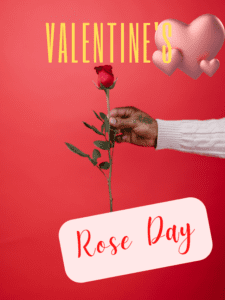Valentine’s Day 2023, also known as Saint Valentine’s Day or the Feast of Saint Valentine, is a holiday celebrated annually on February 14th. It originated as a Western Christian feast day honoring one or two early Christian martyrs named Saint Valentine.
Today, it is a popular occasion for expressing love and affection among romantic partners, friends, and family members. The holiday is associated with sending cards, gifts, and flowers, and expressing love and appreciation through acts of kindness and affection.
Valentine’s Day 2023 – Celebrating Love Beyond Romance is considered an important day for couples and lovers, as it provides an opportunity to celebrate the love and affection shared between them. The day has become a global celebration of love, and its popularity continues to grow each year, making it a significant occasion in modern culture.
What is Valentine Week
Valentine Week is a seven-day celebration leading up to Valentine’s Day, celebrated annually on February 14th. Each day of the week has a special significance and is associated with a different expression of love.
Also Read : How to Make Your First Valentine Day Memorable| 14 February 2023

This week is a time for couples to express their love and affection for each other through various gestures, such as giving gifts, sending messages, and spending time together. It’s also an opportunity for friends and family to show their love and appreciation for each other.
What are the 7 valentines days?
The Valentine week full list 2023 is as follows:
- Rose Day – February 7th 2023 (Tuesday)
- Propose Day – February 8th 2023 (Wednesday)
- Chocolate Day – February 9th 2023 (Thursday)
- Teddy Day – February 10th 2023 (Friday)
- Promise Day – February 11th 2023 (Saturday)
- Hug Day – February 12th 2023 (Sunday)
- Kiss Day – February 13th 2023 (Monday)
- Valentine’s Day – February 14th 2023 (Tuesday)
A brief explanation on importance of each day
“Valentine Week: The Meaning Behind Each Day”
Valentine Week is a seven-day celebration leading up to Valentine’s Day, celebrated annually on February 14th. Each day of the week has a special significance and is associated with a different expression of love.
Here is a brief explanation of each day of the Valentine Week:
Rose Day – February 7th:

On this day, people exchange roses to express their love and affection. The color of the rose has significance, with red roses symbolizing love, pink roses symbolizing admiration, and yellow roses symbolizing friendship.
Propose Day – February 8th:
This is a day for those who are in a relationship or are looking to start one. It’s a day to express love and take the relationship to the next level by proposing to your loved one.
Chocolate Day – February 9th:
This day is dedicated to exchanging chocolates as a symbol of love and affection. Chocolates are a sweet and thoughtful gesture, making this day a popular one among couples.
Teddy Day – February 10th:

On this day, people exchange teddy bears as a symbol of love and affection. Teddy bears are cute and cuddly, making them the perfect gift for your loved one.
Promise Day – February 11th:
This day is dedicated to making promises to your loved one, whether it’s a promise of love, commitment, or support. It’s a day to reaffirm your relationship and build trust.
Hug Day – February 12th:
On this day, people exchange hugs as a symbol of love and affection. Hugs are a physical expression of love and comfort, making this day a special one for couples.
Kiss Day – February 13th:
This day is dedicated to exchanging kisses as a symbol of love and affection. Kisses are a physical expression of love, making this day a romantic one for couples.
Valentine’s Day 2023 – February 14th:
This is the most important day of the Valentine Week, and is dedicated to celebrating love and affection between partners, friends, and family. People exchange gifts, spend time together, and express their love for each other in various ways.
How to Celebrtae Each Day of the Valentine Week
Here are some tips on how to celebrate each day of the Valentine Week:
Rose Day – February 7th:
- a. Buy a bouquet of roses, with the color of the roses symbolizing the nature of your relationship (red for love, pink for admiration, yellow for friendship, etc.).
- b. Give the bouquet to your loved one in person, or send it as a surprise gift.
- c. Spend quality time together and appreciate each other.
Propose Day – February 8th:
- a. Plan a romantic setting for your proposal, whether it’s at a special location or a candlelit dinner. b. Get down on one knee and express your love and commitment to your partner.
- c. Present a ring or other symbol of your proposal.
Chocolate Day – February 9th:
- a. Buy your loved one’s favorite chocolates, or try a new brand or flavor.
- b. Present the chocolates in a special way, such as with a handwritten note or as part of a larger gift.
- c. Enjoy the chocolates together and spend quality time together.
Teddy Day – February 10th:
- a. Buy a teddy bear that you think your partner would love.
- b. Present the teddy bear in a special way, such as with a handwritten note or as part of a larger gift.
- c. Cuddle up with the teddy bear and spend quality time together.
Promise Day – February 11th:
- a. Write down your promises to each other, whether it’s a promise of love, commitment, or support.
- b. Exchange the promises and discuss how you will fulfill them.
- c. Spend quality time together, building trust and strengthening your relationship.
Hug Day – February 12th:
- a. Give your loved one a big, tight hug to express your love and affection.
- b. Take a walk or go out for a meal together, enjoying each other’s company.
- c. Spend quality time together, enjoying each other’s company.
Kiss Day – February 13th:
- a. Give your loved one a passionate kiss to express your love and affection.
- b. Plan a special date night or spend the day together doing something you both enjoy.
- c. Spend quality time together, enjoying each other’s company and building lasting memories.
Valentine’s Day – February 14th:
- a. Plan a special date or gift to express your love and affection.
- b. Spend quality time together, whether it’s a romantic dinner, movie, or outdoor activity.
- c. Express your love and appreciation for each other through words, actions, and gifts.
Is Valentine Day is only for Lovers?
No, Valentine’s Day is not just for lovers. While the holiday is traditionally associated with romantic love, it has evolved to encompass a wider range of relationships and affection. Many people use Valentine’s Day as an opportunity to express their love and appreciation for family members, friends, and other important people in their lives.
Whether it’s through cards, gifts, or special gestures, the holiday can be a celebration of love and affection in all its forms.
So, no, Valentine’s Day is not just for lovers, it’s for anyone you care about and want to show affection to.
Importance of Valentine’s Day:
Valentine’s Day has long been associated with romantic love, with couples exchanging gifts, cards, and expressing their feelings towards each other. However, over the years, the holiday has evolved to encompass a wider range of relationships and affection. Today, many people see Valentine’s Day as an opportunity to celebrate all forms of love, not just romantic love.
Valentine’s Day can be a special time to show love and appreciation to anyone who is important in your life, not just your romantic partner. For example, you can use the holiday to express your love and gratitude towards your family members. Whether it’s your parents, siblings, or children, letting them know how much they mean to you and how much you care about them can make a big difference. You can also celebrate Valentine’s Day with your friends. Whether you’ve been friends for years or just met, showing appreciation for the bond of friendship is always a great way to strengthen relationships.
One of the best things about Valentine’s Day is that it provides an opportunity to get creative and come up with unique ways to show love and appreciation. For example, you can write a special message or create a homemade card for the people you care about. You can also plan a special outing or surprise them with a thoughtful gift. Whatever you choose, the key is to put thought and effort into making the day special for the people you care about.
In conclusion, Valentine’s Day is not just for lovers, it’s for anyone you care about and want to show affection to. Whether it’s your family, friends, or other important people in your life, the holiday provides an opportunity to express love and appreciation in all its forms. So, don’t be afraid to get creative and come up with unique ways to celebrate Valentine’s Day, and remember that the most important thing is to show the people you care about how much they mean to you.
Is there any Anti-Valentine week followed by Valentine week?
Yes, there is an “Anti-Valentine’s Day” or “Singles Awareness Day” week that is celebrated by some people in response to the traditionally romantic nature of Valentine’s Day.
Anti-Valentine week followed by Valentine week, is for all the single and heartbroken souls.
This week, which usually takes place in mid-February, is seen as an alternative for people who are not in a romantic relationship or who prefer to celebrate their own individual happiness and self-love.
The week may include days like “Slap Day,” “Kick Day,” and “Perfume Day” that are meant to be humorous in nature.
However, it is important to note that not everyone celebrates Anti-Valentine’s Day or participates in this type of holiday, and that everyone’s experience of love and relationships is unique and valid. The most important thing is to focus on what feels right and healthy for you, whether that be celebrating Valentine’s Day, Anti-Valentine’s Day, or neither.
The concept of Anti-Valentine’s week is not universally recognized and its origins and purpose can vary. Some may see it as a way for single or heartbroken individuals to acknowledge and express their emotions and experiences, while others might view it as a way to mock or satirize traditional Valentine’s Day celebrations. It is important to note that these events, like Valentine’s Day, are ultimately personal and individual choices and each person has the right to celebrate or not celebrate in a way that feels meaningful to them.
Remember, the goal is to make each day of the Valentine Week special and meaningful, and to show your love and appreciation for the people you care about. Ultimately, it’s up to each individual to decide how they want to approach and celebrate the holiday season.
Image Credit: google , pexels and iStock
Disclaimer:
The content of this article on Valentine’s Day is intended for informational and entertainment purposes only. The views and opinions expressed in this article are those of the author and do not necessarily reflect the official policy or position of any organization or entity. No action should be taken based solely on the contents of this article, and the author assumes no responsibility for errors or omissions. The information contained in this article is not intended as a substitute for professional advice and should not be relied upon in making any decisions related to romantic relationships or gift-giving.
